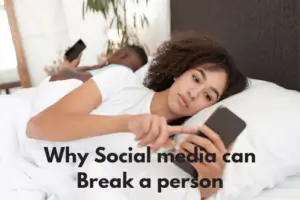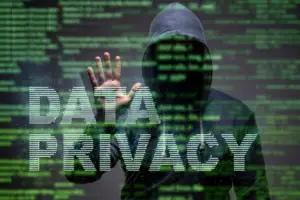This article contains comprehensive information on why social media can break a person.

Introduction
In the modern digital age, the adverse influence of social media has changed the way we connect, communicate, and share our lives. Platforms such as Facebook, Twitter, Instagram, Tiktok and LinkedIn have become integral parts of our lives, making us lose touch of reality. While it was initially celebrated for bringing people together, alongside other benefits, it also has its downsides.
In this article, we will delve comprehensively into why social media can break a person [3]. When it is said that social media can “break” a person, it simply refers to the negative impact that prolonged and unhealthy use of social media platforms can have on an individual’s mental, emotional, and even physical well-being.
This expression highlights how the pressures, comparisons, and negative experiences often associated with social media can lead to significant psychological distress, anxiety, depression, isolation, and a general sense of emotional breakdown. It is therefore safe to say that social media often presents an unrealistic view of life.
This, combined with the need for approval, constant comparisons, and the pursuit of an unattainable digital perfection, can damage people’s mental and emotional well-being. In essence, it suggests that the negative consequences of using social media excessively or in a harmful way can cause serious harm to a person’s overall mental and emotional state, invariably leading to various mental health issues.
Ways Social Media Can Break a Person
With this understanding, there are several reasons why it can also contribute to breaking a person. Here are some of the reasons:
1. Comparison and Self-Esteem
On social media, most users have turned into content creators, with the end goal of cashing out (making money) from their target audience. Sadly, most of these people often present an idealized version of their lives. They create a picture perfect life, put up flashy lifestyles as though they had no challenges. Constant exposure to these carefully curated and filtered contents exposes people to feelings of inadequacy, worthlessness, low self-esteem, and unhealthy comparison and unnecessary pressure to meet up. To achieve this, some social media users may end up living on loans or getting involved in numerous vices to meet up and join the bandwagon. As seen on social media, a lot of people who do this end up badly.
Furthermore, the prevalence of idealized body images and beauty standards on social media can lead to body dissatisfaction and even eating disorders as people strive to meet unrealistic ideals.
In fact, according to a survey by PubMed Central [1] social media have become a popular means of advertisements for cosmetic professional providers and constant exposure of these to media users influences their decisions to go for body enhancement.
This singular issue is the reason a lot of women have subscribed to spending exorbitant amounts on liposuction and BBL [4]. Oftentimes, things go wrong and some ladies lose their lives in the process or health challenges may arise which leave the victims in regrets and agony.
2. Cyberbullying and Harassment

Cyber safety is no longer guaranteed. The anonymity that social media provides can encourage individuals to engage in cyberbullying and harassment. This makes it easier for social media users to engage in cyberbullying without fear of being caught and punished.
Activities such as negative comments, public shaming and trolling can significantly impact a person’s mental and emotional well-being. Such negative interactions can lead to emotional distress, anxiety, and depression.
On a daily basis, people get trolled, sex tapes leaked and lots more. In cases like this, some victims end up hurting themselves when they can’t seem to bear the shame.
Had it been for the anonymity of the internet, it would be easier to fish out and punish cyberbullies who make social media toxic.
3. Privacy Issues And Online Reputation

There is a common saying that “the media never forgets.” Oftentimes, it is used to caution people who are going overboard with the things they put up online.
The fact is that many people use social sites effectively and responsibly, while others use them excessively in the most malicious ways. There is no doubt that some platforms have security policies that protect the privacy of users to a large extent but then again, the things we put up, how we interact and our general conduct in the media is solely our responsibility.
It is important to understand that sharing personal information or engaging in inappropriate behavior on social media can have long-lasting consequences. It can harm personal and professional reputations, jeopardize relationships, and even lead to identity theft or cybercrime. These things can cause emotional trauma.
Recently, I came across a story of a lady whose fiance called off their wedding a few weeks before the event because he came across a malicious comment she made on a random post. The story had it the the lady wrote “I will sleep with a man for one million. That’s such a huge some.” This was a comment she dropped years ago and probably from a place of joke. Whatever may be the case, a single nasty comment cost her something beautiful. This is just one out of the numerous cases of why social media can break a person.
The things you do on social media can either leave a positive or negative footprint.
4. Fear of Missing Out (FOMO)
My job as a content creator makes me an ardent social media user and I can tell you that Social media platforms can drastically amplify the fear of missing out on events, experiences, or trends, which can lead to feelings of anxiety and dissatisfaction with one’s own life.
The Fear of Missing Out [2] can lead to continual checking of social media sites. The idea that you might miss out on something if you’re not online can affect your mental health.
Not everyone can handle the resultant effect of this feeling.
5. Information Overload
Like I would always say, we don’t have control of the things we see on the media but we have full control over how we choose to react. Social media is saturated with information, both authentic and fake.
The rapid flow of information on social media can be overwhelming, leading to stress and anxiety. The spread of misinformation and fake news can further contribute to confusion and emotional distress.
Information overload can sometimes be overwhelming. One way I have been able to survive this is by filtering the people I follow and connect with on social media. Other times, I intentionally ignore some content. Having too much information about a thing can sometimes leave one in a state of confusion and you might want to avoid that for the sake of your mental health.
6. Addiction and Time Management

The constant need for likes, comments, and validation can lead to social media addiction. This addictive nature of social media platforms can lead to excessive usage, affecting productivity, sleep patterns, and overall well-being. Spending excessive time online can isolate individuals from real-world interactions, affecting their mental and emotional well-being. Reports have shown that a lot of social media addicts are prone to been depressed [5]. One might be left to wonder why. Well, the reason is not far-fetched. Too much exposure to picture perfect lives of others is bound to leave you questioning your existence especially if you’re not thriving in certain areas of life.
It is therefore important to know when to draw the lines and not get addicted and distracted and being intentional about time management can help deal with this.
Conclusion
In summary, social media’s impact on mental health can be complex. While it offers connectivity and positive interactions, its potential to exacerbate negative feelings, encourage unhealthy behaviors, and foster unrealistic expectations can contribute to breaking a person’s emotional and psychological well-being. It’s important for you to be mindful of your social media usage, set boundaries, and seek support if you find yourself struggling. Taking a break from social media is a good way to stay sane as a media user.
Hence, it is important for individuals to be mindful of their social media usage, maintain a healthy balance, and practice responsible digital citizenship. By being aware of the potential positive and negative impacts of social media, individuals can make informed decisions and cultivate a positive online presence while protecting their well-being.
Lastly, the ability of social media to break a person is solely dependent on the individual.
References
[1] Arab, Khalid, et al. “Influence of Social Media on the Decision to Undergo a Cosmetic Procedure.” Plastic and Reconstructive Surgery. Global Open, vol. 7, no. 8, 2019, p. e2333, doi:10.1097/gox.0000000000002333.
[2] Frances Dalomba, Licsw. “Pros and Cons of Social Media.” Lifespan, https://www.lifespan.org/lifespan-living/social-media-good-bad-and-ugly.
[3] “How Can Social Media Break a Person?” Quora, https://www.quora.com/How-can-social-media-break-a-person.
[4] Malis, Carolina. “Why the Brazilian Butt Lift Is the Deadliest Cosmetic Surgery Procedure, What the Risks Are and The.” South China Morning Post, 4 Feb. 2023, https://www.scmp.com/lifestyle/fashion-beauty/article/3208844/why-brazilian-butt-lift-deadliest-cosmetic-surgery-procedure-what-risks-are-and-requirements.
[5] Robinson, Lawrence, and M. A. Melinda Smith. Social Media and Mental Health – Helpguide.org. https://www.helpguide.org/articles/mental-health/social-media-and-mental-health.htm
Don’t miss out on current updates, kindly like us on Facebook & follow us on Follow @EAfinder OR leave a comment below for further inquiries





